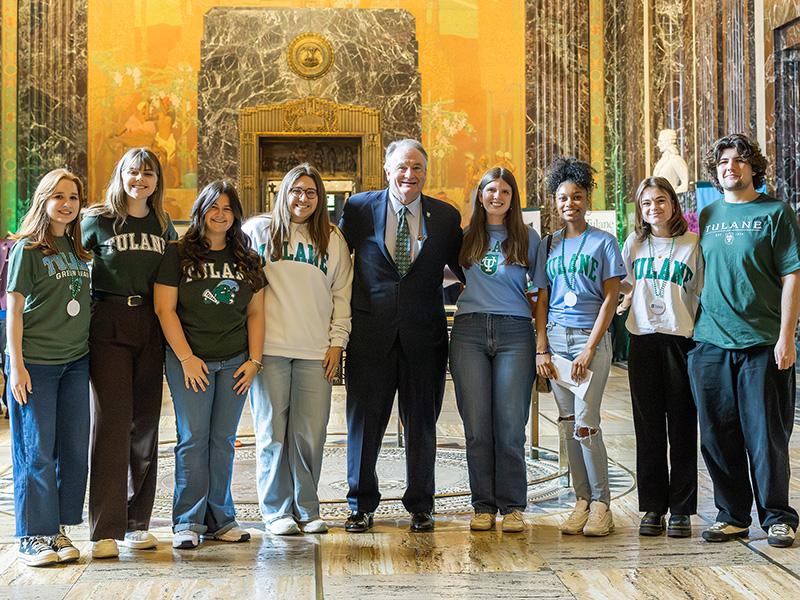Tulane shines at Louisiana State Capitol
Tulane University took center stage at the Louisiana State Capitol in Baton Rouge last week, as university leaders, students, and supporters came together for Tulane Day at the Capitol — a day of celebration and recognition of the university’s impact across the state and beyond.
The annual event provided everyone from President Michael A. Fitts to the university’s legislative scholars an opportunity to engage with lawmakers and state leaders while focusing on how Tulane and the state can continue to support one another.
A highlight of the day was when the Louisiana House of Representatives and Senate passed a resolution recognizing the vital contributions of Tulane to the state, including its groundbreaking scholarship and research and its annual economic impact of $5.2 billion.
The $5.2 billion impact, based on a report issued last summer, is a huge increase from a 2019 study that credited Tulane with a $3.14 billion annual impact to Louisiana’s economy. The university’s remarkable increase in contributions to the state’s economy is due in large part to a surge in faculty research awards, which have risen by more that 70 percent in the last six years.
Tulane’s growing research mission is also the driving force behind Tulane’s downtown expansion, which will be anchored by the redevelopment of the former Charity Hospital building, the repurposing of the Tulane Medical Center building and numerous other projects that will transform the downtown area into a center of bioscience innovation and discovery, reimagine the New Orleans economy and improve lives throughout our state and beyond.
President Michael A. Fitts spoke with WWL about Tulane’s impact on the Louisiana economy.
“Tulane came to the Capitol to celebrate our deep, growing and enduring partnership with Louisiana,” Fitts said. “Through Louisiana Promise – which offers a Tulane education with no loans to Louisiana students from families making less than $100,000 per year – the Legislative Scholarships and the Innovation Institute, we are ensuring that the best and brightest students in the state stay right here in Louisiana. Through our cutting-edge research we are also creating lifesaving treatment and advancements that benefit all Louisianians.”
Tulane’s operations, which are heavily focused on research, its campus expansions and other activities support more than 30,000 jobs across Louisiana and generate $88.2 million in annual state tax revenue.
“We are truly an economic engine for our state,” said Patrick Norton, Tulane’s senior vice president and chief operating officer/treasurer. “Tulane Day is a great moment to underscore how important we are to the state and, in turn, how state support is so vital to us.”
Throughout the day, Fitts, Norton and other Tulane leaders visited legislative and government offices. Meanwhile, the grand Memorial Hall, often referred to as the rotunda, provided a fitting backdrop for Tulane to highlight its various programs and achievements.
“Tulane University is advancing our academic research enterprise, expanding our downtown campus and amplifying our impact on New Orleans and the state of Louisiana,” read one of the posters. “With record-breaking enrollment, growing national recognition and bold investments in innovation and infrastructure, we are building on nearly two centuries of academic excellence to share the future — locally and globally.”
Representatives of the Admissions Office, the Tulane Cancer Center, the Scot Ackerman MakerSpace, the Center for Public Service, Tulane Nursing, the School of Architecture and Built Environment and the School of Science and Engineering handed out water bottles, notebooks, pens and other Tulane swag while also sharing their successes with school groups, legislators and the general public.
At the Tulane Cancer Center table, Tulane senior Chente McAneny quizzed high school students on their knowledge of cancer. At the CPS table, Stacey Plaisance of Tulane’s Communications and Marketing Department, highlighted the work of the School of Architecture and Built Environment’s URBANbuild program. And at the Center for K-12 STEM Education table, Michelle Sanchez, associate dean for community engagement and academic partnerships in the School of Science and Engineering, highlighted how children and teens can get involved with Tulane’s STEM programming, including coastal research.
“We reach about 5,000 kids a year, with middle school tending to be the biggest focus,” said Sanchez, a senior professor of practice. “Our new dean, Hridesh Rajan, thinks the work that we’re doing is really important.”
“Without this scholarship, I don’t know where I’d be. It blessed me with a unique Tulane experience, and I’m elated that I had this opportunity. It’s not every day that you get a full-tuition scholarship to Tulane.”
Justin Thompson, Legislative Scholar
Among the Tulanians making the rounds at the State Capitol were Tulane’s Legislative Scholars. Under the Legislative Scholars Program, which dates back to 1884, Tulane gives each state legislator the opportunity to nominate an eligible Louisiana student to receive a one-year, full-tuition Tulane scholarship paid for by the university. Legislators can renominate the scholarship in subsequent years as they work toward their degree.
“Having the scholarship has meant everything to me,” said Julia Miller, a junior from Baton Rouge who was nominated by Rep. Eddie Lambert. Miller is majoring in anthropology and environmental studies and hopes to find a job in environmental policy, preferably in Louisiana, when she graduates.
Justin Thompson, a senior from Baton Rouge, said he feels blessed to have received the scholarship for the past four years and is grateful to Sen. Larry Selders for having such confidence in him. Thompson is majoring in political economy and minoring in real estate. He is considering enrolling in law school after taking a gap year.
“Without this scholarship, I don’t know where I’d be,” Thompson said. “It blessed me with a unique Tulane experience, and I’m elated that I had this opportunity. It’s not every day that you get a full-tuition scholarship to Tulane.”

